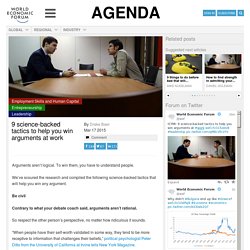

10 tactics for reading people's body language. How to Document a Performance Review. The annual performance review can be stressful.

But while many managers focus their attention on what they’ll say in the face-to-face conversation, they forget the importance of documenting their impressions in the right way. The following piece, adapted from the book Performance Reviews, will help you write down your feedback in a way that will both meet your organization’s requirements and pave the way for an effective discussion. Once you have analyzed your employee’s performance, record your feedback in a way that can be shared and saved. When preparing a formal written assessment, refer back to your company’s guidelines so you’re adhering to the appropriate format. If your company does not have a standard form, create one. Your organization may require you to provide a general rating of the employee’s performance, individual ratings of specific aspects of their performance, or a combination of ratings and qualitative information.
Also include specific examples. 9 science-backed tactics to help you win arguments at work. Arguments aren’t logical.

To win them, you have to understand people. We’ve scoured the research and compiled the following science-backed tactics that will help you win any argument. Be civil Contrary to what your debate coach said, arguments aren’t rational. So respect the other person’s perspective, no matter how ridiculous it sounds. “When people have their self-worth validated in some way, they tend to be more receptive to information that challenges their beliefs,” political psychologist Peter Ditto from the University of California at Irvine tells New York Magazine. With that emotional connection established, you can then start getting logical. Don’t try to ‘win’ the argument Attacking someone’s ideas puts them into fight-or-flight mode.
So if you want to be convincing, practice “extreme agreement”: Take your conversational partner’s views and advance them to their logical — and perhaps absurd — conclusion. Don’t ask why. In a 2013 study, University of Colorado psychologist Philip M. The interview question most people aren't prepared for. Uk.businessinsider. + Job Interview Answers to Behavioral Interview Questions! Why This Is An Excellent Resume. What Are Education Tests For, Anyway? Hide captionThe all-too-familiar No. 2 pencil.

Josh Davis/Flickr Pay attention to this piece. There's going to be a test at the end. Did that trigger scary memories of the 10th grade? Or are you just curious how you'll measure up? If the answer is "C: Either of the above," keep reading. Tests have existed throughout the history of education. Different types of tests are best for different purposes. But these types of tests are easily confused, and more easily misused. Teachers divide tests into two big categories: formative and summative. Formative assessment, aka formative feedback, is the name given to the steady little nudges that happen throughout the school day — when the teacher calls on someone, or sends a student up to the board to solve a problem, or pops a quiz to make sure you did the reading.
Any test given for purely diagnostic reasons can also be formative. Nobody really argues against formative tests, so let's forget about them for now. So, got all that?